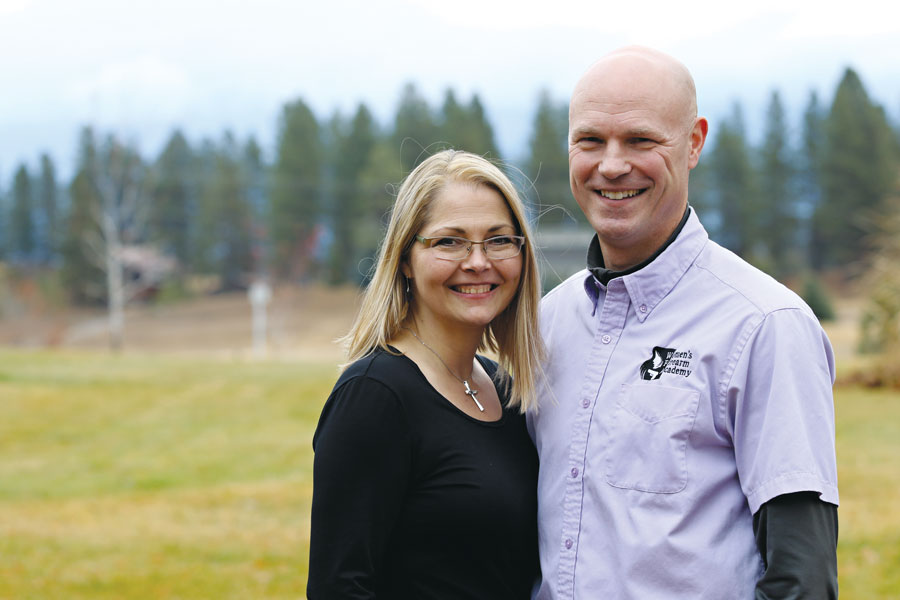Teaching Women How and Why to Shoot
Women's Firearm Academy offers beginner to advanced classes in self-defense, pistols in a judgment-free environment built on learning
By Molly Priddy
In 2011, Victoria Wojciechowski’s life turned upside down with the presence of a man who presented a physical threat to her well-being.
The man had 10 inches and 90 pounds on her, and even though her husband David Wojciechowski was with her, he couldn’t be with her all the time. She went to law enforcement for a restraining order, after which the police told her to find additional forms of protection.
“They wanted my wife to have a form of personal protection,” David said last week. “So we did that.”
Victoria, like many people, didn’t have experience with pistols before, but decided she wanted to carry a one. Going into a sporting goods store to buy a gun resulted in Victoria being told what was best for her, not her being able to figure that out for herself, her husband said.
“More often than not, they said, ‘Oh, you need this,’ or sometimes the phrase ‘little lady’ was used,” David said.
Victoria sighs at the memories. Now a firearms instructor with NRA certification and certification as a Utah Conceal Carry Instructor, she teaches women and men like her who started from zero when it came to firearms. Opening the Women’s Firearm Academy six years ago gave her the opportunity.
Now, the academy, run out of a large, indoor space on the couple’s property off Whitefish Stage, teaches all kinds of courses, from non-lethal self-defense to advanced pistol skills. The basic-level classes run several weeks and allow the students, 70 percent of whom have been women, to find the gun that works for them.
Victoria and David spent $800 on gun rentals trying to find what worked the best for Victoria’s size and comfort level. Eventually, she settled on a .45-caliber pistol.
“This is all built on a six-month journey of me trying to find the gun I wanted. I’m the most accurate with the .45,” she said. “But it was a process for me to find facts and not just opinions about what they thought I should do.”
When she walked into a local sporting goods store and asked for a specific .45-caliber pistol, the salesman refused to sell it.
“He said, ‘Yeah, missy, that gun’s too big for you,’ and he wouldn’t sell it to me,” Victoria said. “I drove to Cabela’s in Idaho and bought it and had them ship it home to me.”
Victoria was extremely transparent about her journey to find her gun. She figured if she was open about it, the man threatening her would hear she wasn’t an easy target. It also had the effect of women asking her questions and for lessons.
The Women’s Firearm Academy starts off with a simple question: Why do you want to carry a firearm?
“Bear protection is different from personal protection,” Victoria said. “Those are the things we talk about in the ‘how do we choose guns’ class.”
Then, the students work up to figuring out which size of gun works for them. Women’s hands are usually smaller than men’s, and despite the good intentions of husbands and sons, a gifted firearm has about as much chance of fitting its recipient as would a bra they picked out for her, Victoria said.
For example, a student was widowed and her son gave her a .45 for protection. During the WFA courses, she decided that a .22-caliber pistol was better for her. When her son protested, he learned she hit three out of 10 targets with the .45, and 10 out of 10 with the .22.
Most of the women who join the classes simply want to better understand firearms so they don’t have to fear them.
“A lot of us have been taught incorrectly or have bad experience with guns,” Victoria said. “We want our ladies to go from fear to empowerment.”
“The ladies are more receptive to coaching,” David added. “You’d be surprised — it’s not uncommon that the ladies will outshoot their husbands because they’re willing to learn and modify.”
Men also take the courses, and David said one recent student said he’d learned how to shoot in the 1970s and “wow, things are different now.”
Victoria is also one of the only certified non-law-enforcement Taser instructors in Montana, Idaho, and Washington. The non-lethal classes also give women a chance to learn about how to protect themselves if they don’t feel they could morally pull a pistol’s trigger on someone.
“There are people who just want to be able to protect themselves,” she said.
The classes discuss ethics, morals, legal boundaries, and more. Essentially, the Wojciechowskis want their students to be prepared for something they hope never occurs.
“It’s better to have it and not need it than to need it and not have it,” Victoria said. “We prepare for something we pray never happens.”
For more information on the Women’s Firearm Academy, visit www.womensfirearmacademy.com or call (406) 318-7233.